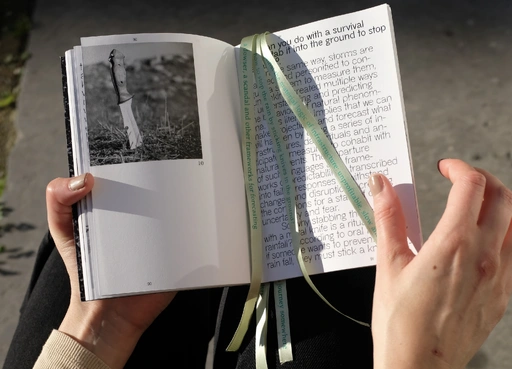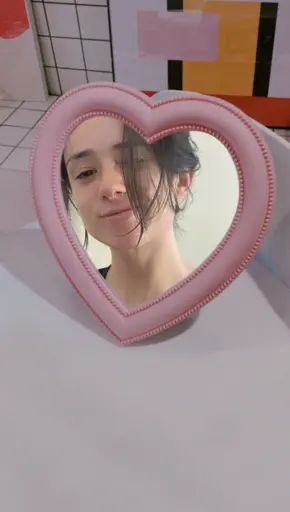output – interview
From the online publication "Fellows Published 2021-2022"
María Mazzanti was one of the nine fellows in the academic year 2021-2022. The interview below is published in the online publication “Fellows Published” that was launched in November 2023.
fellowspublished.rietveldacademie.nl
fellowspublished.rietveldacademie.nl
María Mazzanti is an architect, editor and researcher based between Amsterdam and Bogota, particularly interested in critical spatial practices, publishing and artistic research.
Within the fellowship, Mazzanti has been furthering the ongoing research project Forecasting, Otherwise, which delves into the failures of architecture, boundary-making practices, the urbanisation of natural resources and frameworks of predictability by analysing one case study: The Seasonal flash floods in Barranquilla, Colombia.
Within the fellowship, Mazzanti has been furthering the ongoing research project Forecasting, Otherwise, which delves into the failures of architecture, boundary-making practices, the urbanisation of natural resources and frameworks of predictability by analysing one case study: The Seasonal flash floods in Barranquilla, Colombia.
What was the starting point of your research project?
Forecasting, Otherwise is an ongoing research project that delves into the failures of architecture, boundary-making practices, the urbanization of natural resources and frameworks of predictability by analyzing one case study: the Seasonal flash floods in Barranquilla, Colombia.
What approach did you take for the fellowship research project, and how does it relate to the role of research in your practice?
Rather than conducting a linear analysis of infrastructural failures and plausible solutions, the research fellowship allowed me to navigate Barranquilla’s archives, meteorological data, and discussions with academics, policymakers, urban planners, and communities with curiosity and critical engagement. As a result, my approach to the fellowship was to assess urban planning and architecture through the lens of eco-feminist practices and methodologies for working with sensitive social landscapes and complex environmental issues.
Your work takes you across several countries and continents. How do the different geographies, territorialities, cultures, and local idiosyncrasies affect your research methodologies, and what challenges do you face while working through these differences
Despite its detractors, the term “Anthropocene” remains a fertile ground for contemplating the interconnected webs of humans and more-than-human entities that transcend borders and cultures. Delving into different issues related to the climatic crisis implies exploring different scales and geographies. This is a challenge that exists not only for my research but for any other methodological approaches for working around anthropogenic consequences and infrastructures.
For example, on 11 June 2022, meteorological services in Barranquilla recorded 15% of a year’s rain. On the same day, a tornado struck near Istanbul in Turkey, and a storm wreaked havoc in Ankara while wildfires raged in San Bernardino, California. All these multiplicities and temporalities engendered by anthropogenic forces expose the interconnectivity produced by the weather and our patchy relationship to the environment. Although we all experience weather events locally, when significant meteorological and geological forces take place, they also lay bare the unbalanced levels of exposure that different bodies and communities have to the different political and ecological climates. Despite the ubiquity of experiences poured by atmospheric events, the depiction of climate change and climate policy as a consolidated, unified idea reinforces the assumptions that enable the urbanization of natural resources and environmental injustices in the Global South. Therefore, the big challenge isn’t working with different geographies but recognizing how the bigger narratives of climate change tend to ignore the people exposed to it.
For example, on 11 June 2022, meteorological services in Barranquilla recorded 15% of a year’s rain. On the same day, a tornado struck near Istanbul in Turkey, and a storm wreaked havoc in Ankara while wildfires raged in San Bernardino, California. All these multiplicities and temporalities engendered by anthropogenic forces expose the interconnectivity produced by the weather and our patchy relationship to the environment. Although we all experience weather events locally, when significant meteorological and geological forces take place, they also lay bare the unbalanced levels of exposure that different bodies and communities have to the different political and ecological climates. Despite the ubiquity of experiences poured by atmospheric events, the depiction of climate change and climate policy as a consolidated, unified idea reinforces the assumptions that enable the urbanization of natural resources and environmental injustices in the Global South. Therefore, the big challenge isn’t working with different geographies but recognizing how the bigger narratives of climate change tend to ignore the people exposed to it.

